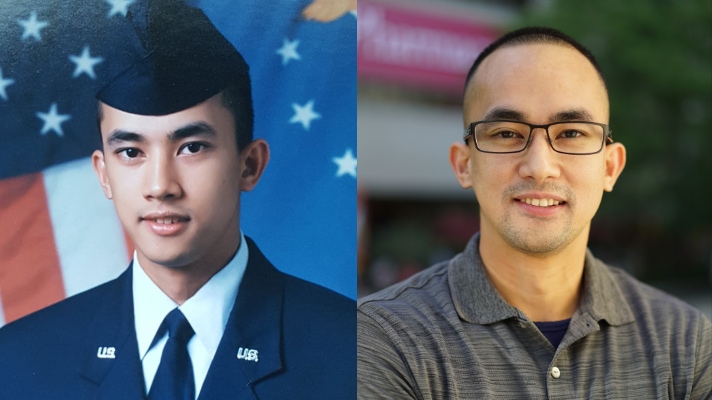Where is your hometown?
I was born in the Philippines and moved to Richmond, California when I was 15. I feel fortunate to have two hometowns: Cagayan de Oro, Philippines and the San Francisco Bay Area.
Tell me about your experience serving in the military. What did you gain from your time in service?
I served in the U.S. Air Force from 2005-2009 and was honorably discharged with a rank of Senior Airman. My official job title was missile and space facilities specialist. My squadron was tasked with maintaining our nation’s intercontinental ballistic missile (ICBM) launch facilities at peak operational capability. It’s a mouthful but essentially, I was an electrician, mechanic, troubleshooter, plumber and custodian rolled into one, working more than 80 hours a week.
The military helped shape who I am today. Some of my more memorable experiences include: boot camp, routine 16-hour shifts underground, relief efforts from the devastation of Hurricane Katrina and deploying to the Middle East. There are pros and cons with almost everything in life, but I really liked the stability, structure and discipline military life demands. Some may find these aspects suffocating, but for me, it was a positive force that guided an otherwise very nonchalant and unmotivated teenager.
What was the driving force behind your decision to join the military?
9/11.
Please share about your path from the military to pharmacy school. What was the biggest obstacle transitioning from military service to student life?
Not a lot of veterans, for one reason or another, continue to pursue higher education. Only a small percentage of veterans end up getting their undergraduate degrees and even less pursue graduate school. For me personally, opting out of the workforce and losing the luxury of a stable paycheck and the lifestyle I’ve learned to embrace was my biggest obstacle. Having to urge myself to go back to school was also a big hurdle.
What attracted you to the field of pharmacy? Any particular moment(s) that made you stop and think, “This is the path I want to take?”
My path to pharmacy was a culmination of many different factors. However, a defining moment that steered me toward pharmacy happened during my deployment to the Middle East. Our primary mission was to safeguard critical assets and maintain the integrity and security of our air base. I, by chance, ended up being posted at the base hospital. During my shifts, I saw quite a few military personnel being rolled in and out of the facility, some in more acute conditions than others. During those moments, I witnessed and started to understand the gravity of patient care and how it translates to health outcomes. It hit close to home because I was seeing fellow troops and thinking about their well-being (and their families) back home. It was an epiphany that sparked my curiosity and eventual journey toward pharmacy school.
Why did you choose USC School of Pharmacy?
Like many of my peers, I was attracted to USC because of its brand and reputation. Now as a third-year student, the USC brand to me represents: competence, innovation, tradition and most importantly, family. Last semester, I coordinated a health fair and due to limitations, our event was held on a weekday during normal business hours. I worried I was going to have a hard time finding preceptors, but my fears were made unfounded. The response I got from our alumni willing to take a day off simply to lend a hand speaks volumes about our program and brand. Through USC School of Pharmacy, I’ve also been blessed with amazing people whom I’ll treasure long after pharmacy school is over. Even though the curriculum has been challenging, I’m grateful I went with my gut instinct and decided to choose USC School of Pharmacy.
What are your career aspirations?
At this juncture, nothing is set in stone. I currently work at Huntington Hospital and so far, I can picture myself working in inpatient care. However, I also have a lingering desire to go back and serve as a military pharmacist, retire after 20 years of service, then transition back as a civilian and perhaps work per diem or maybe even apply to the U.S. Department of Veterans Affairs. Right now, I have all these tangential thoughts, but I suppose only time will tell.
What advice would you give to former members of the military interested in returning to school?
Thank you for your service! Without a doubt you’ve worked hard and sacrificed much. Now, it’s time for you to reward yourself with higher education. Utilize what’s available to you: the GI Bill, grants and other opportunities/services offered to veterans. Most importantly, use the discipline the military has instilled in you to move yourself and your family further and farther! Good luck!


